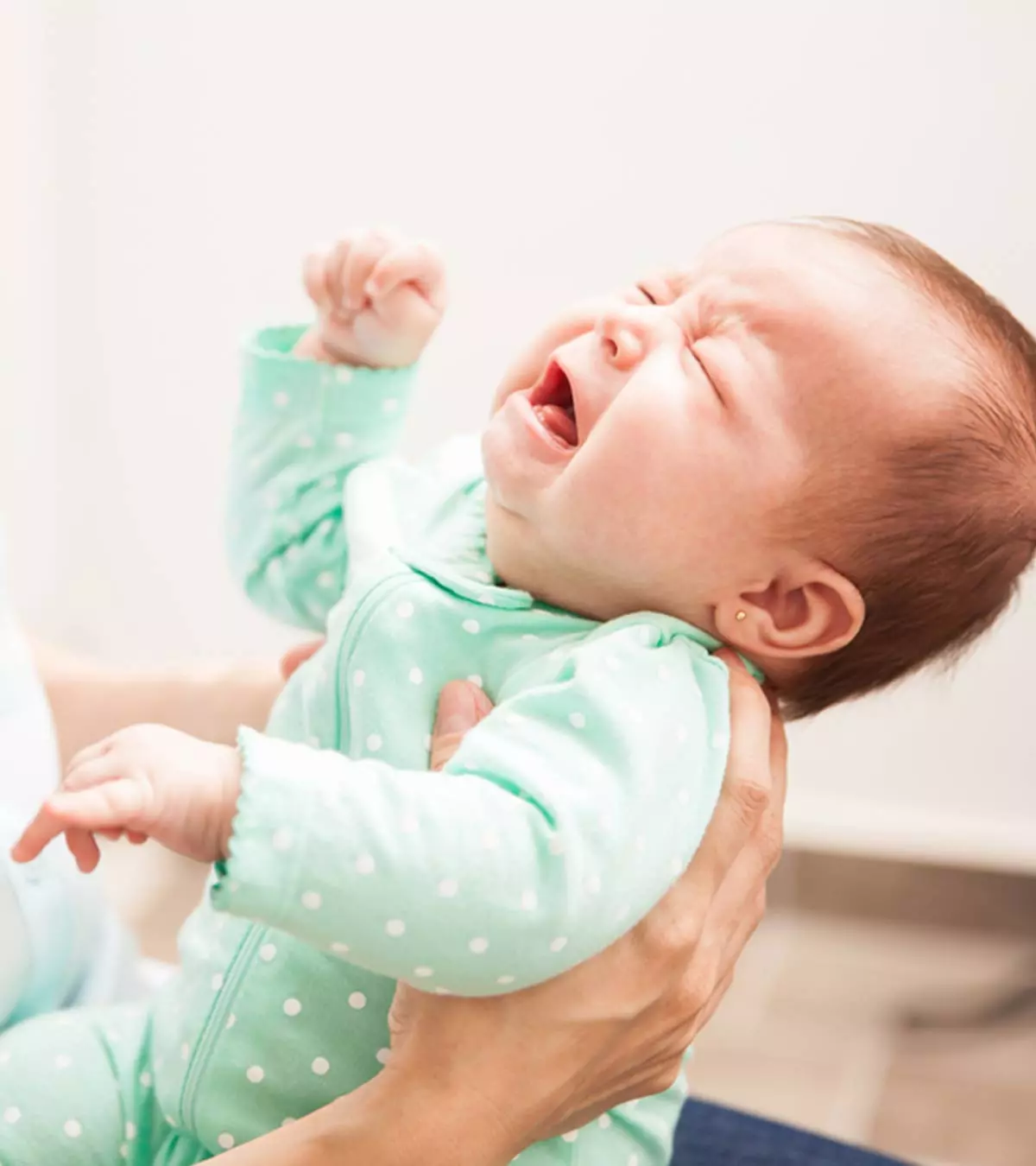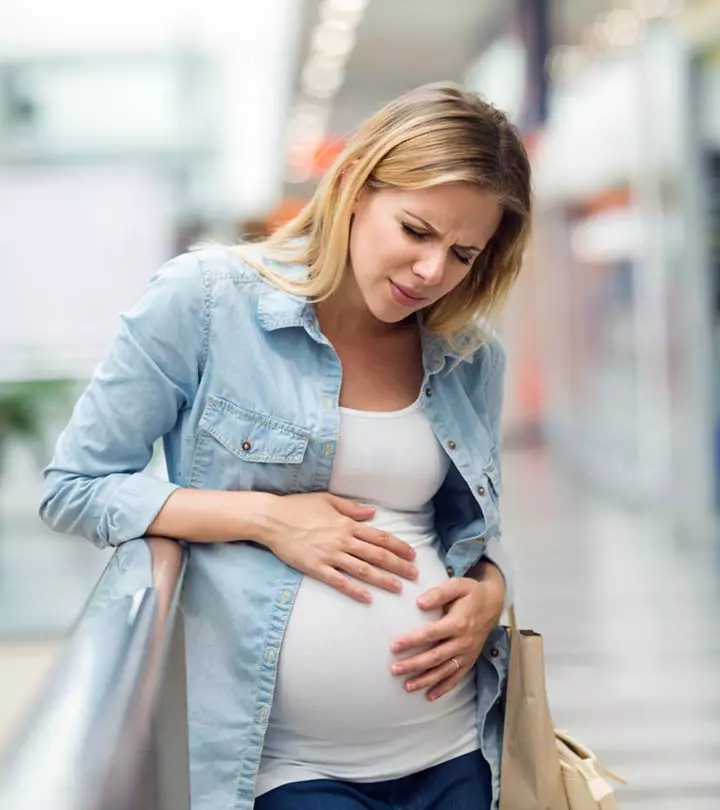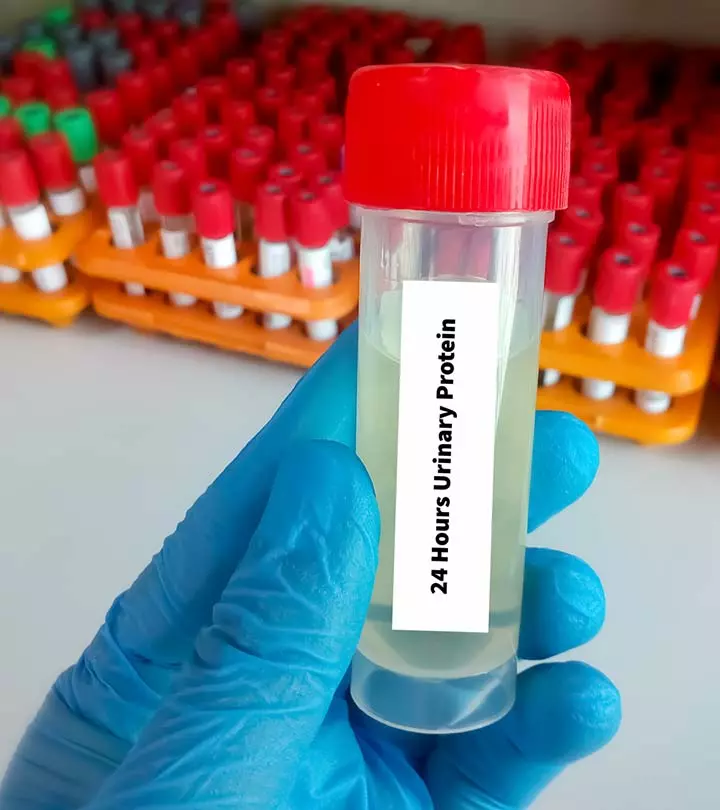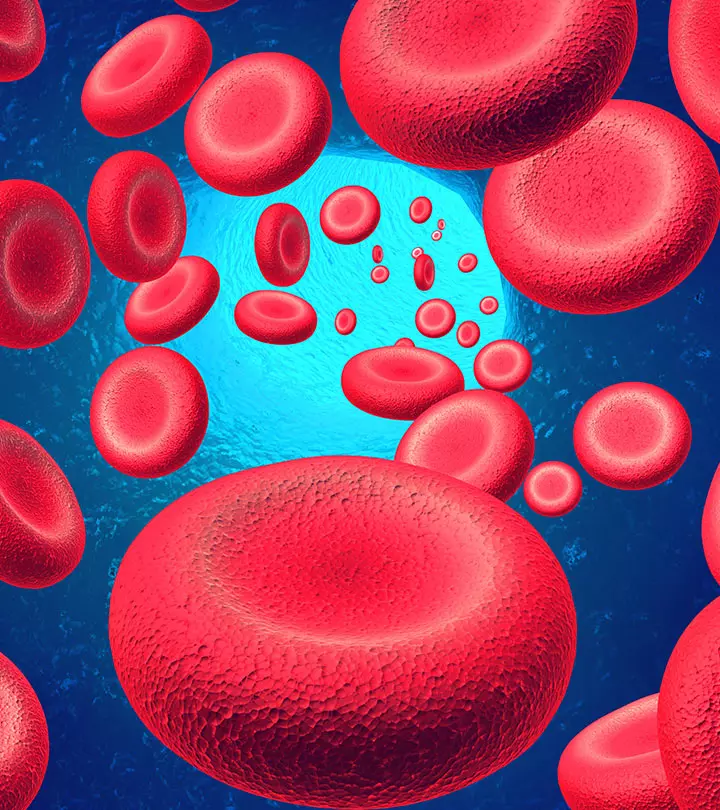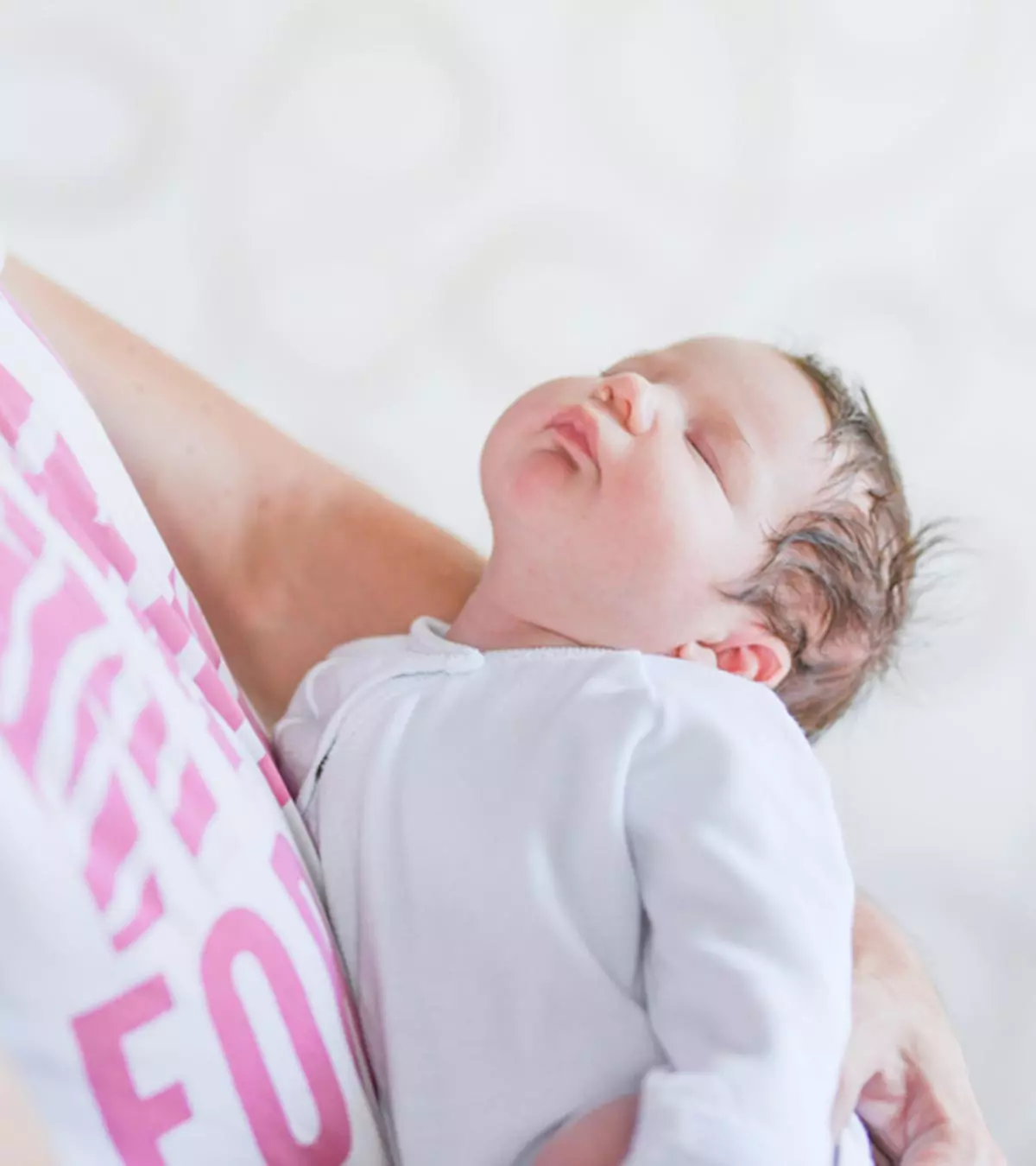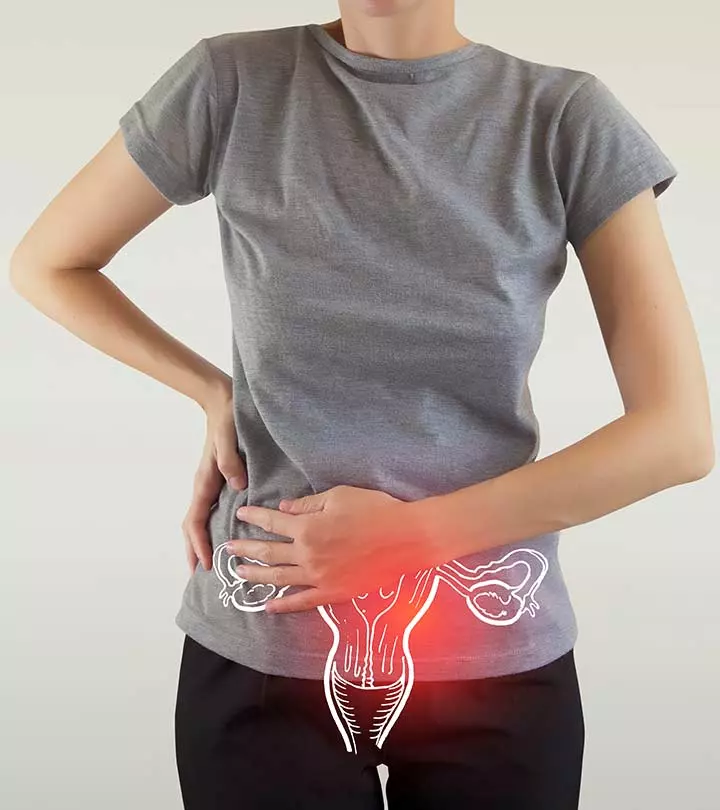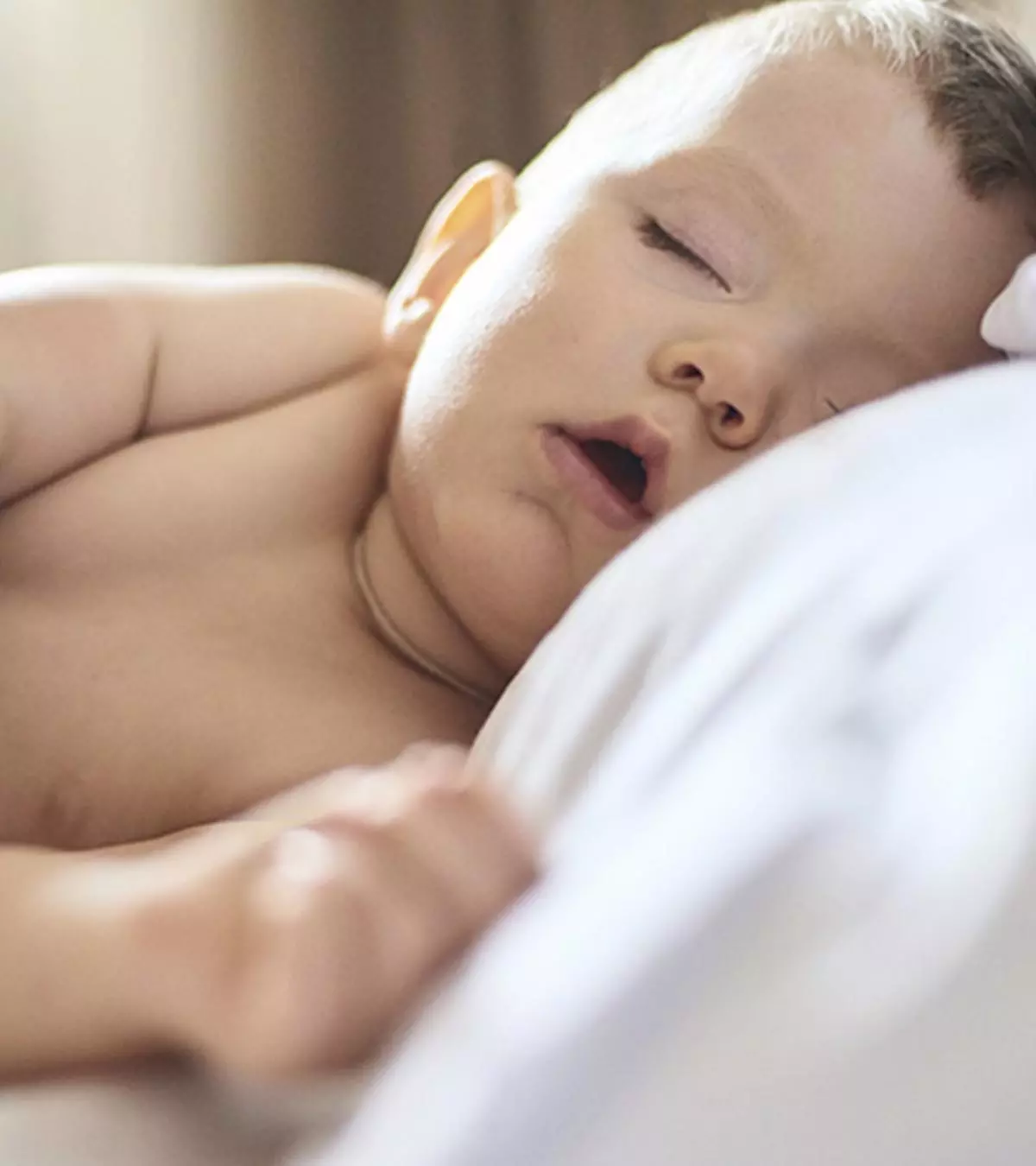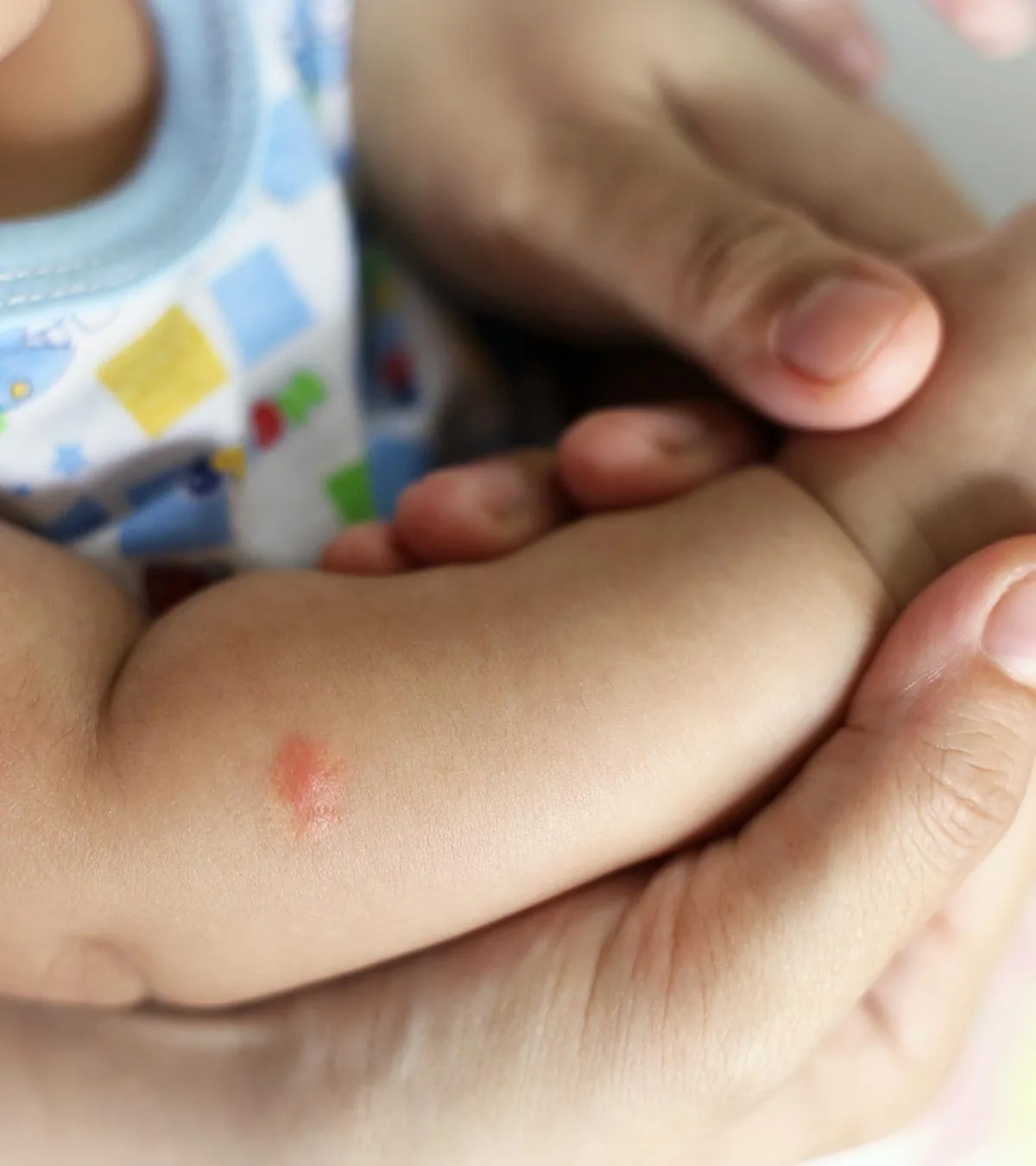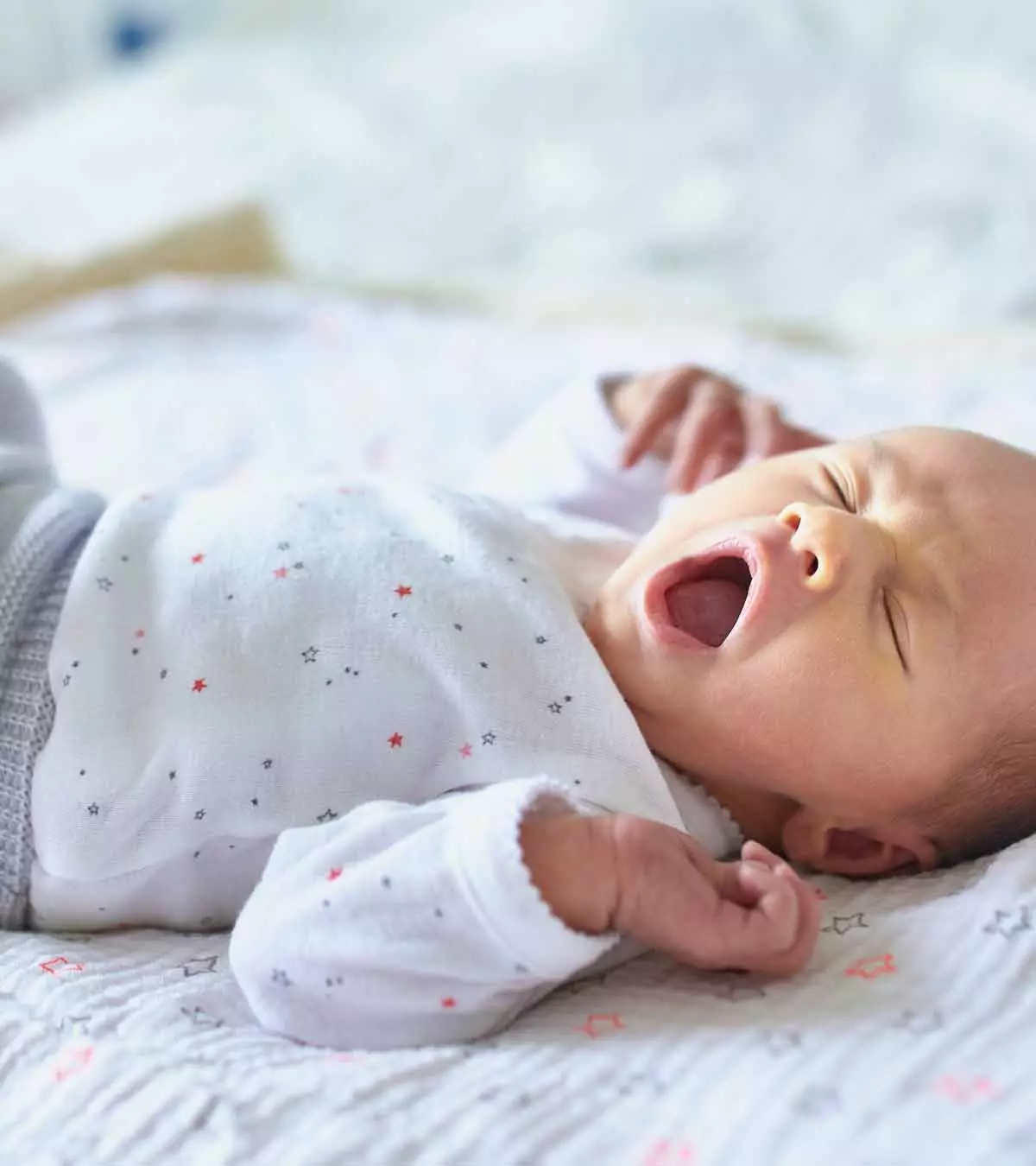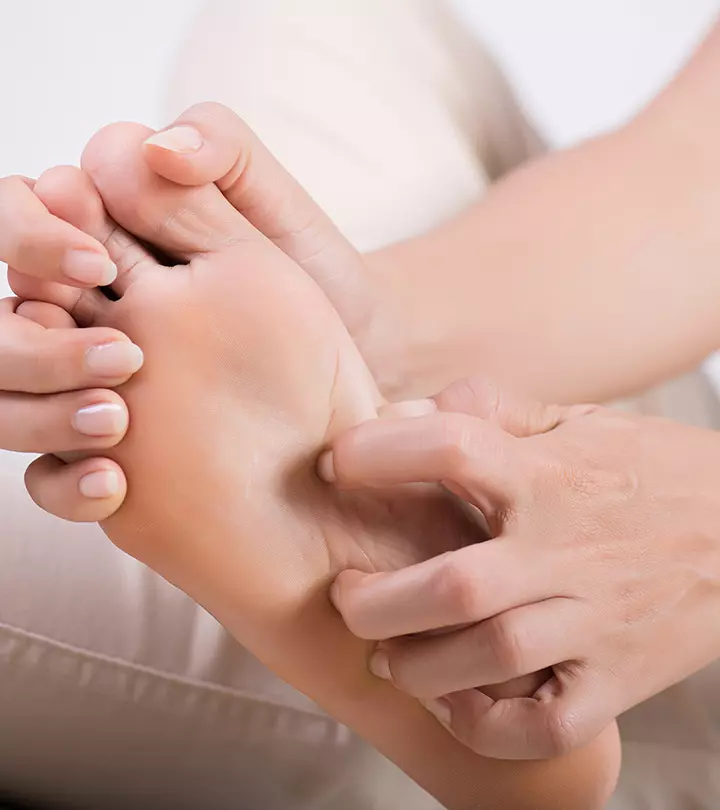
Image: iStock
Itchy feet in pregnancy may indicate intrahepatic cholestasis of pregnancy

. Pregnant women may experience irritation or tingling sensation on the feet with an urge to scratch. Home care measures may help some women find relief from pregnancy-related skin itching (pruritus) in their abdomen, hands, and feet. However, severe itching requires medical care.
Read on to know about the symptoms, causes, treatment, and home remedies for itchy feet in pregnancy.
Key Pointers
- Some pregnant women experience isolated itching in their feet, while others have it all over their bodies, including hands and bellies.
- Cholestasis, a liver ailment that often manifests in late pregnancy, can also cause itchy feet during pregnancy.
- Massaging the feet with moisturizer, taking oatmeal baths, and wearing loose-fitting socks could relieve itchy feet.
Causes And Symptoms Of Itchy Feet In Pregnancy
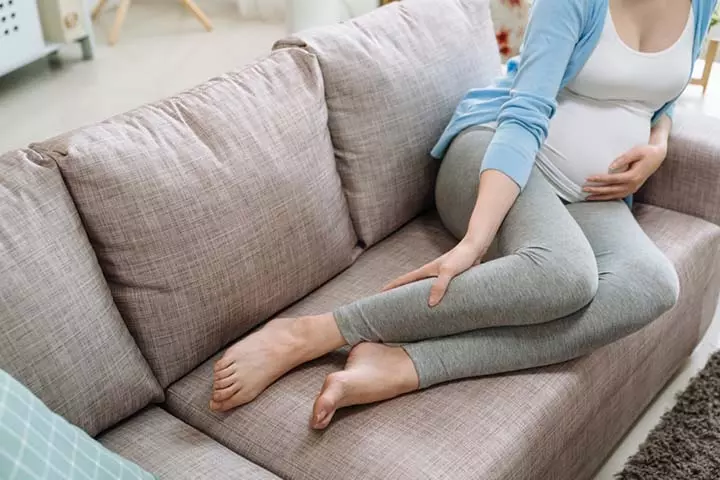
Image: Shutterstock
Pregnant women may develop foot itching due to various reasons. Intense foot itching may be associated with other symptoms depending on the underlying cause. Further, some pregnant women may have isolated feet itching, while few have itching all over the body, including the hands and belly. Some others experience intense feet itching with mild itching in other body parts.
The common causes of itchy feet in pregnancy include (1)
- Hormonal and immune system changes during pregnancy can cause skin irritations. Certain immune system functions may increase or suppress the baby’s growth and development, and these immunity changes can make you vulnerable to skin conditions during pregnancy.
- Intrahepatic cholestasis of pregnancy (ICP) or obstetric cholestasis (OC) occurs due to abnormal bile flow from the liver to the gut during pregnancy. The bile salts under the skin trigger intense itchiness without rashes in the hands and feet and mild itching in other areas. Other symptoms are yellowing of the whites of the eyes and skin (jaundice) and abdominal pain during pregnancy in the right side. A blood test can confirm the diagnosis (2).
- Peripheral neuropathy is nerve damage outside the central nervous system (brain and spinal cord), causing tingling, numbness, pain, and itching in the hands and feet. Lower extremity (feet) neuropathy is common in pregnancy due to nerve compression from the growing uterus. However, the damage reverses (temporary) after delivery (3).
- Psoriasis can cause itchy feet and painful plaquesiScaly and inflamed patches of skin that may or may not be filled with pus on the feet and other body parts in some pregnant women. A collaborative cross-sectional study conducted by several research institutions revealed that the prevalence of psoriasis among adults in the United States stood at 3.0%. Women who have had psoriasis before pregnancy may experience remission or a flare-up while pregnant, while some may experience improvement in symptoms.
- Dermatological issues, such as dry skin, are common reasons for itchy feet, especially in dry climatic conditions. Frequent washing of feet and swimming in chlorinated water can also cause dry skin during pregnancy.
- Atopic dermatitis or eczema can cause dry and itchy feet and skin due to genetic and environmental factors. Some pregnant women can have itchy feet due to dyshidrotic eczema, which is eczema of the soles and sides of the feet.
 Quick tip
Quick tip- Athlete’s foot is a fungal skin infection between toes or other parts of the foot, causing itching and burning sensations in the affected areas. These fungi grow well in warm, dark, and humid conditions, such as inside sports shoes. Maintaining proper hygiene is crucial in preventing and treating this infection.
- Hookworm infections can be caught from walking barefoot on contaminated grounds, mostly in warm climates and sandy areas, causing the hookworm larvae to attach to the feet. It may cause a creeping skin eruption with redness, blisters, and itching in the affected area. Wearing footwear can help in preventing this infection (4).
- Allergic reactions can cause itchy feet in some pregnant women after exposure to certain triggers. These allergy-causing triggers may vary in each case.
- Diabetes can increase the risk of feet itching due to diabetic neuropathies. These are nerve damages caused by increased blood sugar levels, often associated with tingling, burning, and numbing sensations. Diabetes may also increase the risk of conditions causing itchy feet, such as fungal and bacterial infections of the foot and poor blood circulation.
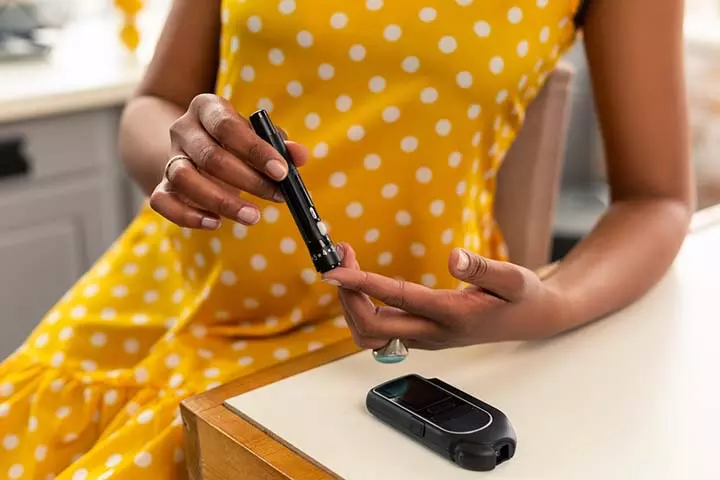
Image: IStock
An itchy belly during pregnancy is common as the skin stretches to accommodate the growing baby. However, itchy feet due to skin stretching is rare. Seek medical care if you experience intense skin or foot itching during pregnancy.
 Quick fact
Quick factHome Remedies For Itchy Feet In Pregnancy

Image: Shutterstock
The following home remedies may help alleviate discomfort caused by itchy feet during pregnancy (1):
- Oatmeal baths can be made by adding a cup of powdered oatmeal to warm bathwater. Alternatively, soak your feet in this oatmeal mixture using a foot spa bucket or basin if you don’t prefer bathing in it. This is an excellent way to improve your foot care routine.
- Apply cold compresses on the itchy area or use cold footbaths, damp cloths, or ice packs wrapped in cloth. Avoid applying ice packs for more than 15 minutes at a time.
- Use unscented moisturizers such as shea butter, colloidal oatmeal, or cocoa butter to prevent and ease itchy feet due to dry skin. These moisturizing agents can effectively combat dryness and provide the necessary hydration to the skin.
 Experts say
Experts say- Foot massages in pregnancy can be particularly beneficial, as they not only help to ease the itching sensation that some women experience but also promote relaxation and improve circulation. Whether using special massagers or hands, these massages can provide much-needed relief during pregnancy.
- Wear breathable (cotton or wool), loose-fitting socks to help prevent sweaty and itchy feet.
Avoid foot creams or other products that cause itchy feet as an allergic reaction
. Likewise, avoid scratching the feet since this may worsen the itch and increase the risk for infections.
Signs You Should See A Doctor
Contact your doctor if you experience any of the following symptoms related to feet itching during pregnancy (5):
- Worsening of itching overtime or at night
- No improvement with home care measures
- Severe itching
- Dark urine
- Grey or pale stools
- Jaundice
- Right-sided abdominal pain
- Stomach upset
- Nausea
Treatment For Itchy Feet During Pregnancy
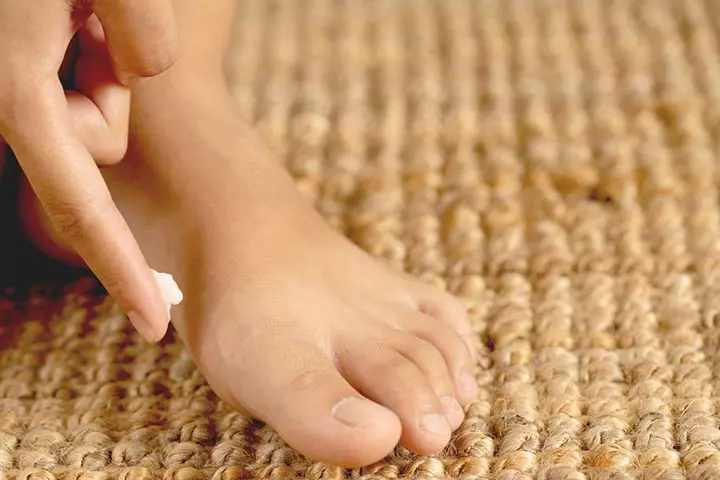
Image: IStock
The treatment options may vary depending on the underlying cause. The following treatments are often prescribed to ease severe feet itching (1):
- Topical anti-itch medications, such as steroid creams, or emollientsiMoisturizing agents to keep the skin smooth and hydrated , help reduce itching.
- Topical antifungal creams, ointments, sprays, or lotions are prescribed for fungal infections of the feet, while antibacterial creams are given for bacterial skin conditions. Some women receive oral medications along with topical medications.
- H1-blocking antihistamineiMedicines used in the treatment of allergy is prescribed if the risks outweigh the benefits in pregnancy since it has teratogeniciToxic substances, a fetal exposure to which may cause congenital abnormalities in the baby effects. Over-the-counter antihistamines are not considered a safe pregnancy medication by the US Food and Drug Administration and should be avoided.
- Ursodeoxycholic acid (ursodiol) is prescribed to lower the level of bile in the blood during cholestasis, to ease itching due to bile salts.
- In addition to topical treatments, lifestyle changes such as dietary modifications may aid in managing symptoms. For example, increasing the intake of fiber and omega-3 fatty acids can support liver function and overall pregnancy health.
- Some women find relief through natural remedies. These may include using essential oils such as lavender or tea tree oil in foot baths to soothe itchy skin. However, the effectiveness and safety of these remedies during pregnancy are yet to be ascertained by research. Thus, using them without consulting with your medical professional is not advisable.
The use of unprescribed over-the-counter medications is not recommended during pregnancy. Appropriate management of the underlying cause can cure foot itching in pregnancy.
Cholestasis In Pregnancy – Things To Expect
Intrahepatic cholestasis of pregnancy (ICP) is a severe liver disorder that can present with intense itching, often requiring careful monitoring and intervention throughout the pregnancy. ICP commonly appears late in the second trimester or early in the third trimester and requires medical attention. Doctors may order frequent fetal monitoring since increased bile production can cause adverse outcomes in pregnancy. They may suggest early labor induction in case of risks of premature birth and stillbirth after evaluating the fetal nonstress tests and biophysical profiles (6). However, ICP is temporary, and the bile flow returns to normal after pregnancy.
 Quick fact
Quick factFrequently Asked Questions
1. How early in pregnancy can cholestasis start?
Usually, the symptoms of itchy feet start in pregnant women when they enter their last trimester (after 30 weeks). However, in some cases, symptoms of intrahepatic cholestasis of pregnancy (ICP) may manifest as early as eight weeks (7).
2. Can itching feet cause congenital disabilities?
There is not much evidence to establish a connection between itching feet and congenital disabilitiesiA structural or functional abnormality present from birth in newborns. Nonetheless, studies have shown that babies with women who have obstetric cholestasis might be at a higher risk of fetal distress and meconiumiThe first poop of a newborn after birth that is usually thick, sticky, and green in appearance aspiration (6).
3. When is being itchy during pregnancy dangerous?
Although mild itching in pregnancy may resolve with home care measures and is seldom harmful, it could indicate a severe problem in some. Therefore, if you experience itching more in the evenings or night, and other signs accompany it, consult your doctor immediately (7).
4. What lifestyle changes can help manage itchy feet in pregnancy?
Having regular foot baths, moisturizing daily, wearing breathable fabrics, making dietary modifications, and managing stress levels can help alleviate itching and improve comfort.
Itchy feet in pregnancy can be caused due to several reasons, including changes in the hormone levels, dryness of the skin, or atopic dermatitis. Non-serious causes of itchy feet can be treated with the help of simple home remedies. But if the symptoms persist even after trying those remedies, consulting a doctor or a skin specialist is advised. It is important to remember that one should avoid using OTC medications containing antihistamines during pregnancy as it might harm the baby, and also refrain from scratching the affected area as it might lead to infections.
Infographic: How To Prevent Itchy Feet In Pregnancy
Itchy feet during pregnancy due to hormonal changes and liver dysfunction may require medication. However, regular foot-care measures can prevent other causes of foot itching. Check out this infographic that provides useful tips to prevent itchy feet in pregnancy.
Some thing wrong with infographic shortcode. please verify shortcode syntax
During pregnancy, your feet, toes and ankles may suddenly become very itchy. Watch this video to understand why this is happening and what you can do to gain relief.
References
- Feet Itching.
https://www.medicoverhospitals.in/symptoms/feet-itching - Intrahepatic cholestasis of pregnancy: What is it?
https://www.nct.org.uk/information/pregnancy/body-pregnancy/itchy-skin-pregnancy-and-intrahepatic-cholestasis-pregnancy-icp - Peripheral Nerve Diseases In Pregnancy.
https://pubmed.ncbi.nlm.nih.gov/23563878/#:~:text=Neuropathies%20during%20pregnancy%20and%20the - Creeping Eruption.
https://www.hopkinsmedicine.org/health/conditions-and-diseases/creeping-eruption - Itching In Pregnancy: Five Things You Need To Know
https://www.nct.org.uk/information/pregnancy/body-pregnancy/itchy-skin-pregnancy-and-intrahepatic-cholestasis-pregnancy-icp - Itching During Pregnancy.
https://www.pregnancybirthbaby.org.au/itching-during-pregnancy - Itching and intrahepatic cholestasis of pregnancy.
https://www.nhs.uk/pregnancy/related-conditions/complications/itching-and-intrahepatic-cholestasis/ - Sophie Weatherhead et al., (2007); Eczema in pregnancy
https://www.ncbi.nlm.nih.gov/pmc/articles/PMC1925231/ - Something else to avoid in pregnancy: Phthalates
https://www.health.harvard.edu/blog/something-else-to-avoid-in-pregnancy-phthalates-2019031516224 - Pillarisetty LS and Sharma A..,Pregnancy Intrahepatic Cholestasis.
https://www.ncbi.nlm.nih.gov/books/NBK551503/
Community Experiences
Join the conversation and become a part of our nurturing community! Share your stories, experiences, and insights to connect with fellow parents.
Read full bio of Dr. Irene (Eirini) Orfanoudaki
Read full bio of Dr Bisny T. Joseph
Read full bio of Rebecca Malachi
Read full bio of Reshmi Das






